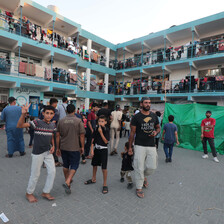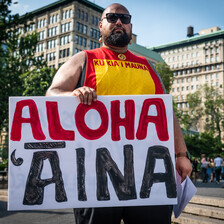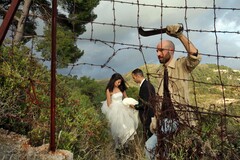The Electronic Intifada 11 September 2025

In his new memoir, Shadi Salem pours his feelings into words as if it were the last human act Palestinians could perform in the face of Israeli destruction.
His slim volume, titled Beneath the Gaza Sky, allows readers to peer into the author’s life and the lives of other ordinary Palestinians from Gaza, spanning from 1992, when he was born, through the ongoing genocide.
Salem grew up as a twin to his brother Fadi in Beit Lahiya, northern Gaza, and studied English language before teaching at the Islamic University of Gaza. Married with two children, Salem departed for Malaysia to attend a training course in September 2023 and has been separated from his family, who remain in Gaza, ever since.
The author has survived several Israeli wars and military operations since 2006, increasing in their brutality to the present genocide.
The first of the full-scale offensives, known among Palestinians, as the author explains, as the Battle of al-Furqan and codenamed by Israel as Operation Cast Lead, was unprecedented in its savagery. It took place over three weeks in winter 2008-2009, when Salem was in 11th grade.
“I rushed out of the house to help and found my friends carrying Shadi … Shadi, the gentle soul loved by everyone who knew him, was gone forever,” Salem writes of seeing a child in the neighborhood torn apart by Israeli missiles.
Complex and captivating
Salem portrays Gaza and its people in all their complexity, beyond portrayals of victimhood.
“Amidst the life of war in Gaza, love cannot be stripped from their lives,” he writes.
“Just as pain exists, so does hope, emerging from the wheat fields, the sands of the beach, and the colorful azure sky of the turbulent blue sea at times and the tranquil sea at others.”
Salem describes places that no longer exist, such as the “unique [and] beautiful” restaurants that lined the Gaza coast.
He notes that “the amusing part is that some of these restaurants have international names but do not serve the corresponding cuisine.”
“The Italian restaurant has no Italian dishes, and there is even a Turkish restaurant that offers everything but Turkish food,” he adds. “These peculiarities add a distinctive character to the dining experience in Gaza, making it an unforgettable part of a visit to this resilient city.”
Salem describes Gaza as a “beautiful small girl” due to her measuring “25 miles long, and a width ranging between 4 and 7 miles,” and where “approximately 2 million Palestinians grow within her.”
Most Palestinians in Gaza originally hail from towns and villages from which they or their families were expelled during the ethnic cleansing of Palestine in 1948 known as the Nakba.
Although Gaza is “captivating,” Salem explains, “all [are] dreaming of return no matter how long it takes.”
Isolation and tradition
Tiny Gaza has been isolated from the rest of the world – even the West Bank – for much of Salem’s life.
Salem recounts the extreme hardship he faced trying to reach the US consulate in Jerusalem to get a visa after he was accepted to an American university.
Ultimately, he explains, “my application was rejected twice due to so-called security bans. This is the answer for everyone; we live in a closed circle of deprivation and frustration.”
The author’s grandmother, Khadra, had a particular impact on Salem’s political awareness and knowledge of Palestinian history.
Salem recounts his grandmother telling him: “My dear, Gaza is unconquerable.”
Salem’s memoir delves into the minutiae of life and traditions in Gaza.
He describes the joyous occasion of an engagement announcement – a gathering at the bride’s home during which sweets are served with coffee.
That is eventually followed by a “henna night,” in which the bride and groom celebrate separately with their family and friends. The following day, they unite for the zaffa wedding procession to the bride’s home, made festive with flowers and traditional music.
From there, they all go to the wedding hall for a final celebration before the bride and groom leave for their new home together.
Salem also writes about the traditional customs of Palestinians naming their firstborn son after their grandfather and the children that follow after “beloved family members, prominent figures in the community, or political leaders.”
On the day the child is given their name, an aqeeqah is performed in which an animal is sacrificed and served to family and friends as well as people in need. Meanwhile, “the weight of the child’s hair is measured, and an equivalent amount of silver is distributed as charity,” Salem writes.
Joy and helplessness
Salem experienced “an indescribable joy” the first time he held his first child, Mohammed.
“I realized in that beautiful moment that I was a father for the first time, ready to face all the challenges of life for him,” he writes, though his joy was mixed with worry about being a good parent.
His daughter, Massa, who was born only 8 months before the genocide began, is “the beloved beauty of my heart and the darling of everyone around her,” according to Salem.
Now outside Gaza, Salem watches the death and destruction helplessly from afar, constantly worried about his loved ones.
His “little home,” an apartment he built by working hard as an English teacher at various education centers, was destroyed early in the genocide. His wife and children have been displaced multiple times. His son, Mohammed, wakes up in the middle of the night terrified and asks for his toys and father.
While reading Beneath the Gaza Sky, I saw many parts of my life reflected back at me.
The chapter “Stories Behind the Wall,” about life in Gaza after Hamas’ unexpected triumph in the 2006 legislative elections and the siege that followed, transported me back to that time. Electricity outages became the norm after Israeli F-16s destroyed the only power plant in Gaza, forcing people to use candles which caused many deadly house fires.
Like the author, I studied the English language at the Islamic University of Gaza, which is now in ruins. Instead of students and faculty, it hosts hundreds of tents housing displaced people.
“In Gaza, everything now exists solely as memories,” Salem writes.
Though the genocide is ongoing, Salem concludes his memoir by focusing on resilience and hope – qualities that Gaza has never lacked despite the immense difficulties it has faced.
People in Gaza press on with “their project of liberation from the forces of oppression and tyranny,” he writes.
Salem’s book is written as a sort of introduction to Gaza for someone who is not from there. It is easy to read and compelling, but it would have benefited from closer editing and polishing. Salem’s text is accompanied by images, some of them of his friends and family and others by professional photographers, but credit is not provided.
Even if imperfectly presented, we must read and listen to the stories of Gaza like those presented in Beneath the Gaza Sky and do whatever is in our power to challenge the relentless injustices against it.
Yousef M. Aljamal is Gaza Coordinator at the Palestine Activism Program at the American Friends Service Committee. Aljamal holds a doctorate in Middle Eastern Studies, is a Palestinian refugee from Gaza and a senior non-resident scholar at the Hashim Sani Center for Palestine Studies, University of Malaya, Malaysia. He has contributed to a number of books on Palestine, including Gaza Writes Back and Light in Gaza.






Comments
Resilience and hope -Home is the tale in Beneath the Gaza Sky
Permalink ANNCHEN DOHERTY replied on
Thanks for this gentle review of Shadi Salem's memoir. I look forward to reading it. Palestinians are truly teaching the world a lesson with their unbelievable resilience and hope. It's breathtakingly tragic for me that, despite Palestinians photographing, recording, videoing and writing about what it's like to live a genocide, the world's leaders STILL haven't managed to stop Israel's inhumane cruelty. I pray that the world's citizens will be able to end this barbaric slaughter soon and those responsible will be brought to account - both within Israel and those supporting it.
Add new comment